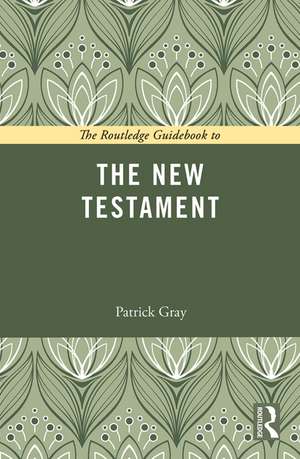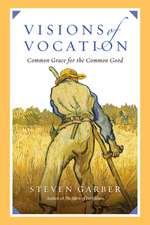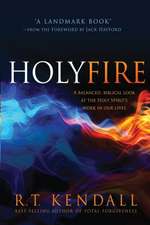The Routledge Guidebook to The New Testament: The Routledge Guides to the Great Books
Autor Patrick Grayen Limba Engleză Paperback – 20 mar 2017
The Routledge Guidebook to the New Testament offers an academic introduction to the New Testament examining:
- The social and historical context in which the New Testament was written
- The primary text, supporting students in close analysis from a range of consensus positions
- The contemporary reception and ongoing influence of the New Testament
| Toate formatele și edițiile | Preț | Express |
|---|---|---|
| Paperback (1) | 246.00 lei 3-5 săpt. | +13.92 lei 7-13 zile |
| Taylor & Francis – 20 mar 2017 | 246.00 lei 3-5 săpt. | +13.92 lei 7-13 zile |
| Hardback (1) | 652.84 lei 6-8 săpt. | |
| Taylor & Francis – 21 mar 2017 | 652.84 lei 6-8 săpt. |
Din seria The Routledge Guides to the Great Books
-
 Preț: 214.40 lei
Preț: 214.40 lei -
 Preț: 213.70 lei
Preț: 213.70 lei -
 Preț: 184.28 lei
Preț: 184.28 lei -
 Preț: 213.58 lei
Preț: 213.58 lei -
 Preț: 214.23 lei
Preț: 214.23 lei -
 Preț: 211.83 lei
Preț: 211.83 lei -
 Preț: 214.67 lei
Preț: 214.67 lei -
 Preț: 220.56 lei
Preț: 220.56 lei -
 Preț: 222.33 lei
Preț: 222.33 lei -
 Preț: 212.60 lei
Preț: 212.60 lei -
 Preț: 213.70 lei
Preț: 213.70 lei -
 Preț: 245.18 lei
Preț: 245.18 lei -
 Preț: 177.32 lei
Preț: 177.32 lei -
 Preț: 213.53 lei
Preț: 213.53 lei -
 Preț: 214.96 lei
Preț: 214.96 lei -
 Preț: 213.48 lei
Preț: 213.48 lei -
 Preț: 214.18 lei
Preț: 214.18 lei -
 Preț: 214.50 lei
Preț: 214.50 lei -
 Preț: 177.32 lei
Preț: 177.32 lei -
 Preț: 213.72 lei
Preț: 213.72 lei -
 Preț: 239.32 lei
Preț: 239.32 lei -
 Preț: 234.39 lei
Preț: 234.39 lei - 24%
 Preț: 162.81 lei
Preț: 162.81 lei -
 Preț: 243.98 lei
Preț: 243.98 lei - 15%
 Preț: 570.13 lei
Preț: 570.13 lei -
 Preț: 217.22 lei
Preț: 217.22 lei -
 Preț: 145.76 lei
Preț: 145.76 lei
Preț: 246.00 lei
Nou
Puncte Express: 369
Preț estimativ în valută:
47.07€ • 49.28$ • 38.95£
47.07€ • 49.28$ • 38.95£
Carte disponibilă
Livrare economică 15-29 martie
Livrare express 01-07 martie pentru 23.91 lei
Preluare comenzi: 021 569.72.76
Specificații
ISBN-13: 9780415729048
ISBN-10: 0415729041
Pagini: 312
Dimensiuni: 129 x 198 x 22 mm
Greutate: 0.32 kg
Ediția:1
Editura: Taylor & Francis
Colecția Routledge
Seria The Routledge Guides to the Great Books
Locul publicării:Oxford, United Kingdom
ISBN-10: 0415729041
Pagini: 312
Dimensiuni: 129 x 198 x 22 mm
Greutate: 0.32 kg
Ediția:1
Editura: Taylor & Francis
Colecția Routledge
Seria The Routledge Guides to the Great Books
Locul publicării:Oxford, United Kingdom
Public țintă
Postgraduate and UndergraduateCuprins
Abbreviations
Introduction
I. The Context of Early Christianity and the New Testament
II. The Literature of the New Testament: The Gospels and the Acts of the Apostles
Mark
Matthew
Luke-Acts
John
III. The Literature of the New Testament: Letters
The Letters of Paul
Romans
1 Corinthians
2 Corinthians
Galatians
Ephesians
Philippians
Colossians
1-2 Thessalonians
The Pastoral Epistles (1-2 Timothy, Titus)
Philemon
The Letter to the Hebrews
The General Epistles
James
1-2 Peter
1, 2, 3 John
Jude
IV. The Literature of the New Testament: Apocalyptic Literature
Revelation
V. Key Concepts
VI. General Issues
What do we know about the life of Jesus?
What language did Jesus speak?
How do we know what Jesus really said?
How should the miracles in the New Testament be understood?
Did Jesus found a new religion?
Is the New Testament anti-Semitic?
Who wrote the New Testament?
How do we know when the books of the New Testament were written?
Why does the New Testament contain (only) twenty-seven books?
How should one read the non-canonical writings?
How are the Dead Sea Scrolls related to the New Testament?
Should the New Testament be read "literally"?
What special methods do scholars use to interpret the New Testament?
VII. For Further Study
Bibliography
Index
Introduction
I. The Context of Early Christianity and the New Testament
II. The Literature of the New Testament: The Gospels and the Acts of the Apostles
Mark
Matthew
Luke-Acts
John
III. The Literature of the New Testament: Letters
The Letters of Paul
Romans
1 Corinthians
2 Corinthians
Galatians
Ephesians
Philippians
Colossians
1-2 Thessalonians
The Pastoral Epistles (1-2 Timothy, Titus)
Philemon
The Letter to the Hebrews
The General Epistles
James
1-2 Peter
1, 2, 3 John
Jude
IV. The Literature of the New Testament: Apocalyptic Literature
Revelation
V. Key Concepts
VI. General Issues
What do we know about the life of Jesus?
What language did Jesus speak?
How do we know what Jesus really said?
How should the miracles in the New Testament be understood?
Did Jesus found a new religion?
Is the New Testament anti-Semitic?
Who wrote the New Testament?
How do we know when the books of the New Testament were written?
Why does the New Testament contain (only) twenty-seven books?
How should one read the non-canonical writings?
How are the Dead Sea Scrolls related to the New Testament?
Should the New Testament be read "literally"?
What special methods do scholars use to interpret the New Testament?
VII. For Further Study
Bibliography
Index
Notă biografică
Patrick Gray is Associate Professor of Religious Studies at Rhodes College.
Recenzii
This exceptionally helpful and highly readable Guidebook is ideal for anyone looking for an introduction to the New Testament and its world. This book will enable a reader to appreciate the New Testament and its subsequent influence with greater depth and insight. Informed by the latest scholarship, it presents the range of scholarly views on key matters of debate, and the definition of key terms and answers to ‘frequently asked questions’ add greatly to its value. Paul Trebilco, University of Otago, New Zealand
Descriere
As part of the Christian canon of scripture, the New Testament is one of the most influential works in history. Its impact can be seen in many different fields, but without an awareness of the historical, cultural, social, and intellectual context of early Christianity, it can be difficult for modern-day readers to fully understand what the first-century authors were trying to say and how the first readers of the New Testament would have understood these ideas. With further reading suggestions, this guidebook is essential reading for all students of religion and philosophy, and all those wishing to engage with this important work.







